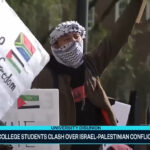Women’s Studies and the Moral Vacuity of an Academic Boycott Against Israel
Seeming to give proof to Orwell’s observation that some ideas are so stupid they could only have been thought of by intellectuals, yet another academic association—this time the National Women’s Studies Association (NWSA)—has followed the lead of the American Studies Association, the American Anthropological Association, the Asian Studies Association, and several others by ignobly voting to approve another academic boycott of Israel.
With the characteristic pseudo-intellectual babble that currently dilutes the scholarly relevance of the social sciences and humanities, the NWSA’s recommendation to approve a boycott announced that, “As feminist scholars, activists, teachers, and public intellectuals we recognize the interconnectedness of systemic forms of oppression,” that “interconnectedness,” no doubt, justifying the singling out of Israeli academics for their particularly odious role in the oppression of women in the Middle East. “In the spirit of this intersectional perspective,” these moral termagants continued, “we cannot overlook the injustice and violence, including sexual and gender-based violence, perpetrated against Palestinians and other Arabs in the West Bank, Gaza Strip, within Israel and in the Golan Heights, as well as the colonial displacement of hundreds of thousands of Palestinians during the 1948 Nakba.”
Apparently, this rarified “intersectional perspective” has not enabled NWSA members to notice the injustice and violence currently being meted out against Israelis, either as a result of the shower of some 12,000 Hamas rockets launched from Gaza since 2005 with the intention of murdering Jewish civilians, or as part of the ongoing “knife Intifada” which has claimed the lives of over 20 Israelis in the past few months who have been murdered by psychopathic Palestinians wielding knives, guns, rocks, and automobiles used as weapons.
But facts and history are not the concern of the morally-elevated professoriate. Based on this politically-charged, biased language, the boycotters expose that they have, with the breathtaking certainty that only the very sanctimonious and intellectually-elite can do, framed the Israeli/Palestinian conflict in such a way that they have determined precisely which side is worthy of opprobrium and which, by virtue of its perennial victimhood, is worthy of complete moral support. Revealingly, the language conjuring up “the colonial displacement of hundreds of thousands of Palestinians during the 1948 Nakba” reveals the victim-centric, oppression-laden worldview of the NWSA, in which the legal creation of the Jewish state is framed as an unjust colonial enterprise during which innocent, indigenous Arabs in a factitious country called Palestine experience a “Nakba,” a catastrophe, in which they were either ethnically cleansed from their lands or remained and now live in the oppressive, apartheid, racist state of Israel.
That historically inaccurate view is not at all surprising, given the ideologues within the NWSA who both crafted the language of the recommendation and pushed through the boycott resolution within the organization. One of these virulent anti-Israel activists, Simona Sharoni, is one of the co-founders of Feminists for Justice in/for Palestine, the ad-hoc group that sponsored NWSA’s pro-boycott campaign. Sharoni, a professor of gender and women’s studies at the State University of New York at Plattsburgh, is also, not coincidentally, one of the founders of the anti-Israel International Solidarity Movement (ISM)-linked group, Women in Black, an organization that is an apologist for the terrorist group Hamas and works diligently to interfere with Israel’s self-defense. In fact, Rachel Corrie, the notorious ISM activist who was killed in 2003 while throwing herself in front of an armored bulldozer to interfere with the IDF as it attempted to destroy a terrorist’s home in Rafah, was Sharoni’s protégé, making it quite clear where Sharoni stands, ideologically, when it comes to the Israeli/Palestinian conflict and how she influenced the NWSA vote.
Another toxic anti-Israel activist who promoted the NWSA boycott vote was Rabab Abdulhadi, ethnic studies professor and Director of the Arab and Muslim Ethnicities and Diasporas Initiative (AMED) at San Francisco State University. Abdulhadi welcomed the shift in NWSA’s ideology to an anti-Israel position, observing that the organization previously “went hand in hand with Zionist influence in the women’s movement and women’s and feminist scholarship.” Her enmity toward Israel is so extreme that she not only denounces Zionism and the colonial oppression she believes Israel represents, but extols the virtue of terrorism against Israelis.
Last year, for example, AMED sponsored an event where students could make posters that said, “My Heroes Have Always Killed Colonizers,” meaning Jews, along with images of the convicted hijacker and member of the Popular Front for the Liberation of Palestine, Leila Khaled, holding a gun. Abdulhadi has referred to Khaled as “an icon for women’s liberation,” and has lauded Sheikh Raed Salah, the leader of the northern branch of the Islamic Movement in Israel who has been convicted of funding Hamas. Abdulhadi and a SFSU delegation met with these two repellent individuals on a recent trip.
In 2003, The American Studies Association voted to approve a boycott of Israeli universities, at that time the largest academic group to do so. When asked why, of all the nations on earth, many with abysmal records on human and civil rights and educational opportunities, Israel had been singled out for condemnation, Curtis Marez, ASA’s then-president and an associate professor of ethnic studies at the University of California, San Diego, disingenuously answered that “one has to start somewhere.” Just as it was very clear what the darker motivations of the ASA were in targeting Israel alone for derision, it is equally clear that the moral narcissists of the NWSA are so blinded by their obsession with the perceived oppression, gender violence, and racism of Israel that the organization could make such a breathtakingly obtuse statement as the allegation that Israel is guilty of “sexual and gender-based violence, perpetrated against Palestinians and other Arabs in the West Bank, Gaza Strip, within Israel and in the Golan Heights.”
Perhaps it has escaped the notice of the NWSA experts on gender and sexuality issues that if one wanted to punish any Middle Eastern country for its subjugation and abuse of women, Israel would probably not be the first nation to come under reasonable or justifiable scrutiny for a group dedicated “to principles of human rights, justice and freedom for all, including academic freedom.” Totalitarian and despotic regimes throughout the region have created an oppressive group of social pathologies that negatively affect women, including genital mutilation, stoning of adulteresses, “honor” killings by fathers and brothers who have been shamed, cultures of gender apartheid in which women are seen as property with no emotional or physical autonomy, ubiquitous sexual assault, and a general subjugation of women, complete with regulations governing behavior, movement, speech, and even requirements that women be covered by burqa or hijab.
The society of the Palestinian territories, most appropriately, might provide some examples of relevance for feminists trying to identify misogyny and suppression of the human and civil rights women, even though the NWSA saw fit to answer “the 2005 call by Palestinian civil society for Boycott, Divestment, and Sanctions (BDS) of economic, military and cultural entities and projects sponsored by the state of Israel,” and have not a single negative word to say about the Palestinians and the conditions of Arab women. In fact, according to Palestinian Authority (PA) Minister of Women’s Affairs, Haifa Al-Agha, women in this culture are singularly “unique,” but not in the way someone with Western values might think; she was quoted in the official PA daily Al-Hayat Al-Jadida as observing “the Palestinian woman’s uniqueness, which differentiates her from the women of the world, as [only] she receives the news of her son’s martyrdom with cries of joy.”
Perhaps mothers embrace this cult of death for their children because of the oppression they experience in their own lives. Zainab Al-Ghneimi, head of the Women’s Legal Counseling Center, commented that a Palestinian man “believes he has bought the woman and paid for her, and therefore she has become his property and must obey his orders . . . [Palestinian] laws give him the right of ownership, based on the man being the guardian, and he is the one who commands and prohibits.” This gloomy situation for women was supported by a study discussed in a November 2014 Al-Hayat Al-Jadida story which reported that “53% of Palestinian women have been exposed to violence —63.3% of them once—and that 18% of non-married young women have been exposed to physical, psychological and sexual violence.” Even more depressing, the newspaper reported in a 2015 article, Palestinian women feel that violence and abuse towards them is justified. The story reported that “41% of the women agreed that violence was justified if the woman leaves home without notifying her husband, while 74% agreed that violence was justified if she neglected her children.”
Nor would NWSA members have difficulty looking for the oppression of women in some of Israel’s neighboring countries, nations with dreadful records of protecting the rights, lives, and bodies of women. A 2015 Thomson Reuters Foundation poll, for example, “assessed 22 Arab states on violence against women, reproductive rights, treatment of women within the family, their integration into society and attitudes towards a woman’s role in politics and the economy,” and raised serious concerns about the status of women in those countries—all of which seemed to slipped off the moral radar screens of the NWSA.
Egypt, which was the worst offender for providing a safe haven for women, was rampant with “sexual violence, harassment and trafficking combined with a breakdown of security, high rates of female genital mutilation and a rollback of freedoms since the 2011 revolution.” The country’s anarchy and political instability have meant that women have also become sexual prey, with 99.3 percent of women and girls likely to be sexually harassed and “27.2 million women and girls—or 91 percent of the female population” becoming victims of female genital mutilation.
Iraq appears second in the rankings, many of the problems affecting women the result of “a dramatic deterioration in conditions for women since the 2003 U.S.-led invasion,” as well as “mass displacement [that] has made women vulnerable to trafficking and sexual violence.” “The Iraqi penal code,” the study found, also “allows men who kill their wives to serve a maximum of three years in prison rather than a life sentence.”
In Saudi Arabia, as yet another example, women are considered to be the virtual property of men, cannot go out in public unaccompanied, and “are banned from driving and need a guardian’s permission to travel, enroll in education, marry or undergo healthcare procedures.” The male-dominated culture means that “marital rape is not recognized and rape victims risk being charged with adultery.”
Syria, which has imploded from internecine warfare and murderous carnage, resulting in the death of more than 250,000 Syrians, has become even more dangerous for women, the Thomson report found, so that in the fog of civil war “Girls as young as 12 have been married in refugee camps,” and “more than 4,000 cases of rape and sexual mutilation have been reported to the Syrian Network for Human Rights,” with “reports of government forces and armed militias sexually abusing women and girls during home raids and in detention centres [sic].”
Stoning to death of women, who are most likely to be victims of this form of torture, is still widely practiced throughout the Middle East—for example, in Iran where stoning is a legal punishment and which, according to the Thomson report, “has the world’s highest rate of execution by stoning;” in Nigeria where stoning is a punishment for adultery in the country’s 12 northern states; in Somalia where “stonings happen more regularly . . . than many other Muslim-majority countries, primarily in areas under the control of Islamist groups like al Shabaab and Hizbul Islam;” and Sudan where “stoning is a legal form of punishment for adultery under the 1991 penal code.” Tellingly, Israel is not on the list of countries which have legalized or tolerate stonings, but the NWSA’s high-minded and self-righteous activists still chose to focus on the perceived political and social defects of Israel and wore blinders when faced with the pathologies and cultural misogyny of the repressive nations surrounding the Jewish state.
Like other members of the academic Left, who believe their worldview is correct and virtuous because it seeks to create a world in which social equanimity will be realized by the downtrodden, members of the NWSA, similar to their fellow travelers in other academic associations, are content to support such intellectually dishonest campaigns as academic boycotts because doing so enables them to denounce Israel as an imperialistic, racist, militaristic oppressor. “Moral narcissists,” observed legal commentator Jay B. Gaskill, “have adopted a camouflage strategy to escape the moral disapproval of others [and] . . . they accomplish this camouflage by cloaking their narcissism in the trappings of ‘social justice positioning.’”
The moral narcissist’s reasoning may be defective, ahistorical, counter-intuitive, or just wrong, but he still feels good about himself. But in this worldview there can be only one enemy of justice, and Israel is that enemy.
Richard L. Cravatts, president of Scholars for Peace in the Middle East, is the author of Genocidal Liberalism: The University’s Jihad Against Israel & Jews.




